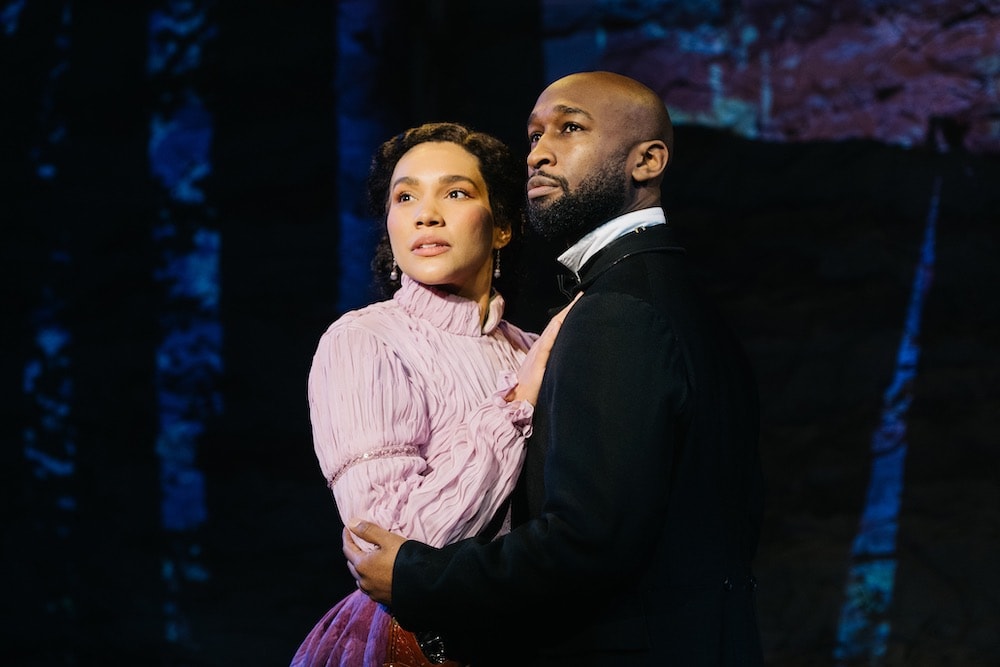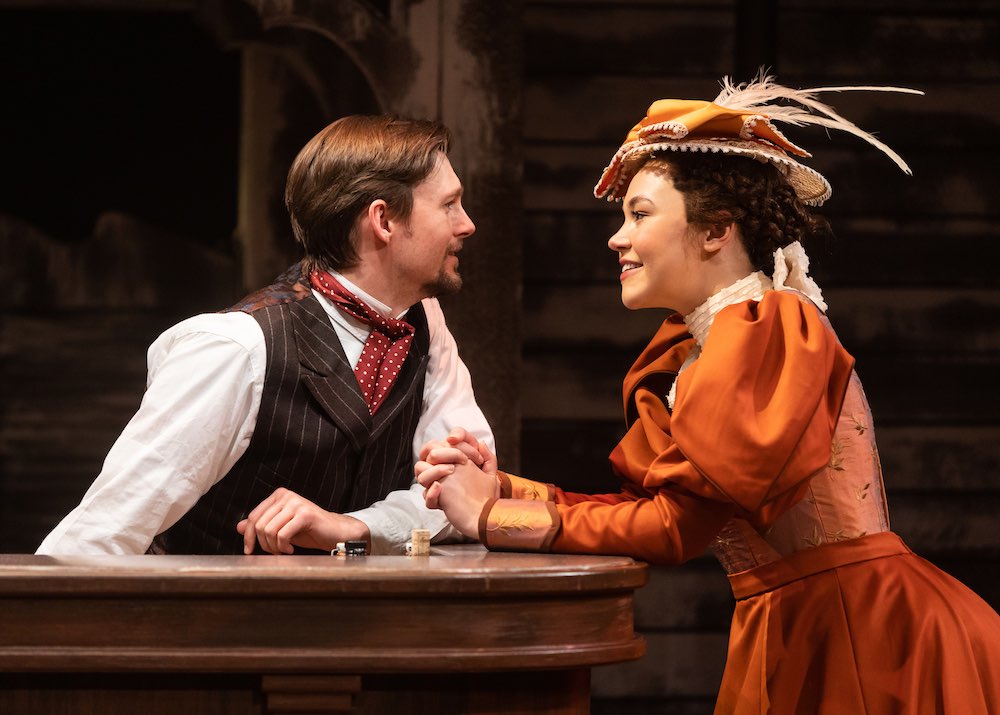It may surprise you (as it did me) that the title of this melodic world-premiere musical does not refer to gunpowder. The word gun means there’s a pistol (which gets dramatically deployed). But the word powder refers to the ivory-colored concealer that a fair-skinned African American woman applies desperately to her face and upper torso in order to keep her husband-to-be believing that she is white like he. Adding to her predicament: the white man she’s to marry has hired help who are Black like she.
That piquant scene, which the bride-to-be sings alone at a dressing table, is laced with race-based tension and set to lovely music—as is the rest of the show, which on the surface is an enchantingly entertaining Wild West adventure yarn. Set in post-Emancipation Texas against pretty painterly projections and performed by an expert cast with exquisite voices, the show is tunefully ear-pleasing and a stunning eyeful—even as it touches deftly the third rail of race and identity in America.

Gun & Powder was conceived by Angelica Chéri, who wrote the book and lyrics based on the lives of her two great-great aunts, Mary and Martha Clarke. They were light-skinned African American twins whose sharecropper single mother, Tallulah Clarke (Marva Hicks), was deep in debt to their white landlord. On impulse, Mary (Solea Pfeiffer) and Martha (Emmy Raver-Lampman) decide to head west and pass for white in order to get money for their mother by any means necessary. As Chéri’s family lore had it, Mary and Martha became outlaws and made out like bandits. In the captivating show Chéri created, with luscious music by Ross Baum, the sisters also each fall in love: Mary with a white man, Jesse (Dan Tracy), whom she marries, and Martha with that man’s Black butler, Elijah (Donald Webber Jr.).
Early on the show is propelled by an engaging payback momentum: There’s a terrific comic scene in a train car occupied by white passengers. When Mary and Martha enter, appearing to be unaccompanied white women, two of the men start taking sexual advantage of them. Martha whips out the pistol her mama gave her and takes aim. Abruptly all the men grovel, emptying their pockets of dollar bills and tossing them to the sisters. With that, Mary and Martha are off and running on what becomes a cunning crime spree to take back wealth that was stolen from their enslaved forebears.
That revenge engine gets sidetracked by romance, however, as Mary’s and Martha’s respective love affairs unfold. And it is here, in various scenes of intimacy and self-revelation and sexual connection, that the show’s script and songs soar with profound perception about how race and authentic sense of self relate.

One outstanding example is a scene with Elijah alone on stage. It is just after he has met Martha and, sensing she seems “somethin’ familiar,” suddenly feels seen by her. He has a heartrending solo, sung gorgeously by Webber:
ELIJAH: …I’M SUPPOSED TO BE INVISIBLE….
I KNOW TO KEEP QUIET,
MY FACE TO THE FLOOR….
THEY TELL ME I’M LOWLY,
NOT MUCH OF A MAN….
THEY TELL ME I’M WORTHLESS,
JUST MADE FOR THEIR SERVICE,…
BUT THAT DON’T MAKE SENSE TO ME.
NO, NOT ANYMORE.
‘CAUSE SHE SAW WHAT THEY CAN’T SEE.
WITH HER, I MIGHT NOT BE INVISIBLE.
Meanwhile, Mary, about to wed the rich white man who is smitten with her, longs to be seen for who she is. As she frantically powders herself, we hear Pfeiffer’s lovely voice singing achingly as if to Jesse:
MARY: I’M WHAT YOU WANT.
ALL YOU COULD WANT….
I DO THE TRICK.
I DO MY BEST.
I PLAY THE PART. I PASS THE TEST.
OH LOVER,
WOULDN’T YOU LOVE ME JUST THE WAY I AM?

Before Mary and Martha set off on their spree—which Elijah will later scoff at as their “Robin Hood crusade” of “shootin’ and stealin'”—their mother cautioned them:
TALLULAH: JUST BEWARE MY DARLIN
NOT TO GIVE YOUR SOUL AWAY,
IF YA PLAY THIS DANG’ROUS GAME,
DON’T FORGET WHAT’S IN YOUR VEINS.
And that theme of blood-based racial identity courses through the show, culminating in a rousing all-company finale, led by Mary:
MARY: I CAN’T RUN FROM WHAT THE TRUTH IS,
‘CAUSE THE TRUTH IS…
IT’S IN THE BLOOD, IT’S IN THE BLOOD,
IT WAS IN THE BLOOD ALL ALONG.
WHO I AM.
ALL I AM.
HERE I AM.
ALL OF ME.I CAN COVER IT UP,
I CAN TUCK IT AWAY,
BUT AT THE END OF THE DAY,
THE BLOOD WILL STILL BE,
OH THE BLOOD WILL STILL BE,
ALL OF ME….
When the white journalist John Howard Griffin underwent dermatological treatment in order to pass as Black—which he wrote about in his 1961 book Black Like Me—he did so in order to learn about racism in the segregated Deep South as experienced by the people on whom it came down. In an analogous way, the ingenious storyline of Gun & Powder—in which two Black women pass as white in the latter 19th-century West—interrogates and illumines how and why racist white people acted then as they did.
But anyone who knows of the so-called “one-drop rule” in America’s history might be taken aback at how Gun & Powder leans into the biologism of race. The one-drop rule in U.S. law (which defined a person as Negro if they have only a drop of African blood) is unique to America and has applied only to American Blacks, typically with racist intent and consequences. Gun & Powder clearly seeks to reclaim and redeem racial biologism as a triumphal metaphor for unity, empowerment, self-acceptance, and pride. Certainly that’s the musical and lyrical note on which the show ends, and surely it speaks upliftingly in these terrible times. Still, one cannot forget that the one-drop rule was historically, in Audre Lorde’s famous phrase, a master’s tool.
Running Time: Two hours 25 minutes, including one intermission.
Gun & Powder plays through February 23, 2020, at Signature Theatre – The Max, 4200 Campbell Ave. Arlington, VA. For tickets, call (703) 820-9771 or go online.
READ David Siegel’s rave review, “Signature Theatre’s commanding ‘Gun & Powder’ pulls no punches.”





Neither the word “white” nor the word “black” is a proper noun and, therefore, does not merit automatic capitalization of the first letter. It’s a minor point but one that calls attention to itself in a visually distracting way. Just saying.
Thank you for your comment, Jenni. Some time ago, I began capitalizing Black and not white as a matter of cultural respect and personal preference—a style choice recognized in this article from the Columbia Journalism Review…
https://www.cjr.org/analysis/language_corner_1.php.
DC Theater Arts has no “house style” on the matter; it is left up to individual contributors, as, I believe, it should be.